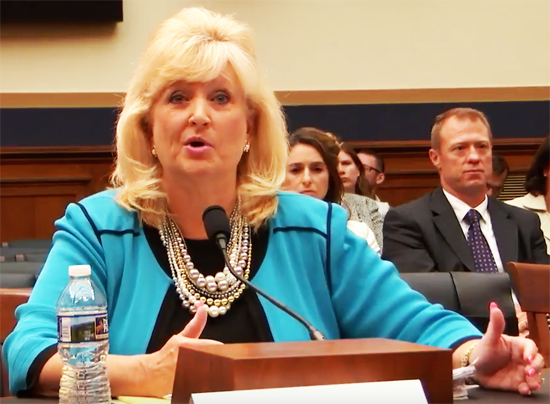
Congressional committee explores lawyer RX advertising
By Phil Riske | Senior Reporter/Writer
 ften adversaries, doctors and lawyers squared off last Friday in testimony about “Examining Ethical Responsibilities Regarding Attorney Advertising” before the House Constitution and Civil Justice Subcommittee (of which Rep. Trend Franks of Arizona is a member.) Chairman Bob Goodlate (R-Va.) said that based on responses received so far from state bars, there are few if any reported complaints of lawyer misconduct regarding commercials that seek clients by reporting problems with drugs and medical devices.
ften adversaries, doctors and lawyers squared off last Friday in testimony about “Examining Ethical Responsibilities Regarding Attorney Advertising” before the House Constitution and Civil Justice Subcommittee (of which Rep. Trend Franks of Arizona is a member.) Chairman Bob Goodlate (R-Va.) said that based on responses received so far from state bars, there are few if any reported complaints of lawyer misconduct regarding commercials that seek clients by reporting problems with drugs and medical devices.
“The lack of complaints, however, does not diminish the fact that severe injury and death resulting from these commercials are being reported to the Food and Drug Administration, Goodlate said.
Physician testmony
“I urge federal policy makers to ensure transparency and balance by attorney advertising related to medical treatments, Ilana Kutinsky MD, director of Atrial Fibrillation Services at William Beaumont Hospital
“The misrepresentation of facts seen in attorney advertising in mass tort ads creates fear and potential treatment noncompliance of patients as well as undermining the patient-physician relationship,” she said.
Kutinsky told the panel of an elderly patient of hers, who after several years of taking the anticoagulation drug Xarelto, quit taking it for her atrial fibrillation after receiving a flyer from a “solicitous attorney that likely has no medical background at all.”
She later suffered a massive stroke.
“Medical attorney advertising should contain a clear disclosure, warning patients from taking any action prior to discussing with a qualified medical professional, Kutinsky said. “Such a disclosure would send the patient back to their physician for informed consent and preserve the physician-patient relationship.”
Vascular surgeon Shawn Fleming MD, Novant Health Vascular Specialists, brought up the case of a television reporter covering war in the Middle East.
“You may recall CNN reporter David Blum died of [pulmonary embolism] while covering the war in Iraq. When reviewing this patient’s medical record and history of medications, I noted he had been recently diagnosed with pulmonary embolism and that he had been prescribed an anticoagulant by his internist.
“During our discussion, the patient told me he was not taking his anticoagulation medication, nor would he ever. He specifically cited a commercial he had seen as the reason for not following his doctor’s advice. Several weeks later, I learned that the patient had passed away and that the cause of death was determined to be recurrent pulmonary embolism,” Fleming testified.
Lawyer testimony
Scottsdale lawyer Lynda Shely said, “In all of my years advising law firms about their ethical obligations in advertising, including ten years as the State Bar of Arizona Director of Lawyer Ethics, I have never once heard of a consumer complaining to a state lawyer regulation office that they were misled by a lawyer advertisement about a pharmaceutical.”
“Overly broad constraints on commercial speech can be anti-competitive and may even have the effect of raising fees charged to consumers by reducing information about which lawyers are available to provide similar legal services,” Shely said.
She noted the upcoming 40th anniversary of the United States Supreme Court decision Bates v. State Bar of Arizona, 433 U.S. 350 (1977) in which the court held that lawyer advertising is commercial speech, protected by the First Amendment.
“ Indeed the Court confirmed that lawyer advertising benefits consumers by providing information about the availability of legal services. The court noted that factually accurate advertising could make legal services more accessible to the general public and improve the overall administration of justice. The court rejected the “highly paternalistic” approach that the state must protect citizens from advertising . . .” Shely said.
Drug injury advertising is big business in the United States, said Elizabeth Tippet, assistant professor, University of Oregon School of Law.
“Lawyers generally do not make up drug injury claims out of thin air,” Tippet said. “Instead, they monitor existing systems for identifying and responding to adverse medical events. She said that when researchers discover patterns of adverse events, the information is disseminated through scientific journals and sometimes the news media.
Drugs featured in attorney advertising are usually still available on the market, and it is rare for FDA intervention to result in pulling a drug from the market completely, the committee was told.
Franks did not ask questions of the witnesses.











